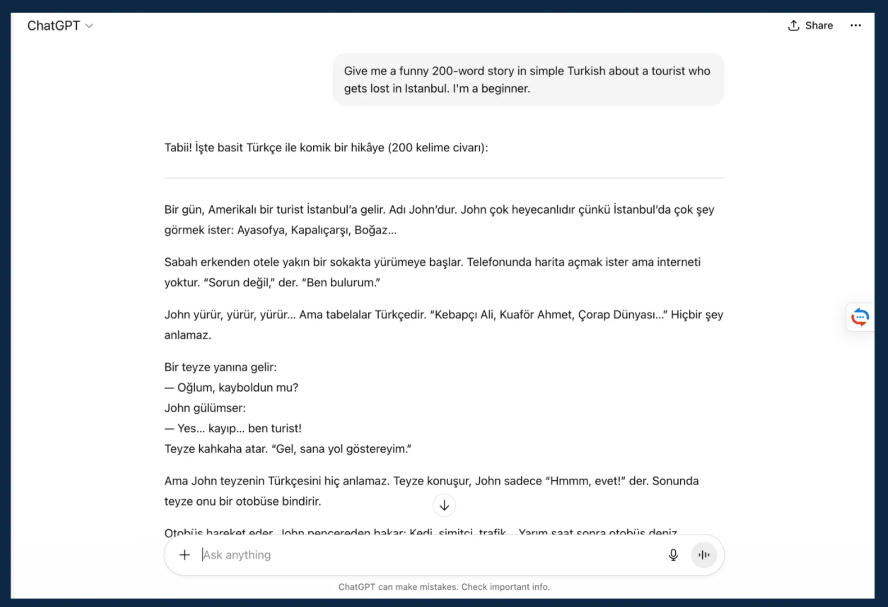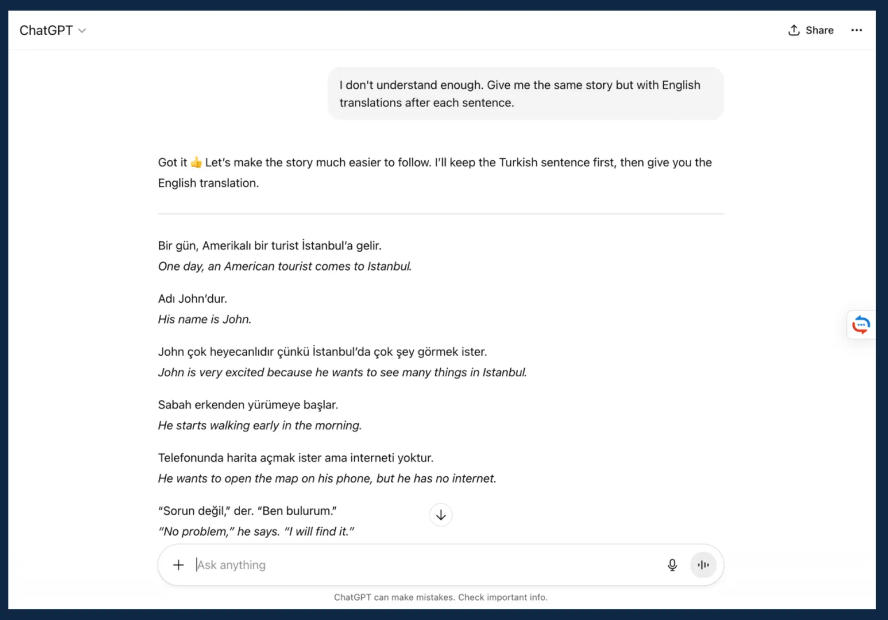TL;DR Summary
CChatGPT is a useful tool — a conversational sandbox, question-answer partner, and source of examples. But it’s limited: it can’t replace real listening, rich context, or immersion. Use it strategically (e.g. for explanations, example sentences) while keeping your core effort in input and natural interaction.
***
ChatGPT won’t learn a language for you, but it’s an excellent to enhance your learning.
Pros: ChatGPT can give your reading and listening a boost, creating summaries, simplifying difficult topics, and making literature more accessible.
Cons: conversations feel robotic, so it can’t replace real human interaction.
Have you used ChatGPT for language learning? It’s an interesting idea, and I’ve found some different examples of how to use artificial intelligence to give your studies a boost. Some language learners use ChatGPT to generate stories with the 200 most common words. Others use ChatGPT as a speaking partner. The conversations are robotic, but they’re conversations nonetheless. These approaches aren’t very attractive to me, but it did get me thinking. In this post, I’ll share how I can use ChatGPT to learn languages more efficiently.
1) Supplement My Reading & Listening
Lately, I’ve been listening to a Turkish podcast series that summarizes popular self-help books. I listen to this series because it’s interesting, but also because the vocabulary is pretty repetitive. It’s easy to listen to. I supplement my listening with book summaries produced by ChatGPT.
For example, if an episode of the series discusses Atomic Habits, I’ll ask ChatGPT for a 1000-word summary of Atomic Habits in Turkish. Naturally, the summary is rich in high-frequency vocabulary and the language is inevitably simpler. Then I imported it into LingQ and studied it.
I can do this with any book. Pick the 10 bestsellers in English, ask ChatGPT to summarize them in Turkish, Spanish, French—you name it—and now you’ve got a goldmine of learner-friendly, high-frequency input.
This is important. Artificial intelligence does not replace listening and reading as the best approach to language learning. It merely enhances our experience. Now, when I listen to this Turkish podcast, I can listen to episodes with more familiarity and background knowledge.
2) Explore More Complex Topics
I love history. It’s a fascinating field of study, but the vocabulary can be dense and difficult to grasp. ChatGPT is a great tool to make difficult genres more approachable.
“Write a 1000-word summary of the Ottoman Empire,” I asked ChatGPT. Boom—done in seconds. Then I tried, “Summarize Turkish history since 1900.” No problem.
You can do this with any topic: Islamic philosophy in Central Asia, ancient Persian poets, you name it. Just feed it to ChatGPT in your target language, import it into LingQ, and now you’re reading about something that actually interests you, in the language you’re learning.
This is a fantastic way to explore deeper content without needing a PhD-level reading ability. And it’s helping me move through Turkish at a solid pace, as my spiked curiosity naturally leads to more reading and listening.
3) Make Literature Accessible
Another potential way to learn a language with ChatGPT: literature. Literature in your target language can be dense. These types of texts are linguistically richer and more challenging for language learners. ChatGPT can help us enjoy these materials more easily.
I became a member of a Turkish audiobook site, Storytel, and downloaded novels by Elif Şafak. Listening was difficult—too much I didn’t understand. So I got an ebook version, imported it into LingQ, and started slowly building up familiarity.
Then I asked ChatGPT to summarize the book—in Turkish. The result? Excellent. It gave me the major characters, themes, structure. With that overview and some help from LingQ, I can now enjoy the story more while reading.
You don’t need to read 300 pages cold. A summary gives you a foothold. Combine that with LingQ or another tool, and suddenly literature becomes accessible (and more enjoyable).
ChatGPT Prompts for Language Learners
Successfully using ChatGPT as a language learner requires good prompts. Here are a few study tips:
- Be specific: Give the topic, word count, and language.
- Provide context: Mention your level (beginner, intermediate, advanced).
- Give the format: Ask for a summary, story, or dialogue.
- Provide feedback: If ChatGPT is not giving you what you want, share your thoughts and try again.


Example Prompts
- Beginner (Spanish):
“Write a 200-word story in simple Spanish using the 100 most common words. Add an English translation.” - Intermediate (French):
“Summarize the book Atomic Habits in French, 800 words, B1 level vocabulary.” - Advanced (German):
“Write a 1500-word essay in German on the cultural impact of Martin Luther. Use C1-level vocabulary.”
Copy, paste, and adapt these to your own language practice interests.
Why I Don’t Use ChatGPT for Speaking Practice
I’ll be honest—I don’t talk to ChatGPT.
I’m not into robotic conversations. I prefer the real thing: I meet with two Turkish tutors, four sessions a week. Of course, artificial intelligence is still present. One of my tutors uses ChatGPT to generate grammar examples for me, based on where I struggle. Then he sends me a detailed write-up.
However, this raises an important question. Why are you learning a language?
Personally, I value human and tailored interactions.
But I get it. If you want to use ChatGPT to practice speaking, go for it. It’s just a bit rigid and not how I prefer to learn.
Final Thoughts
In the end, ChatGPT is a tool. And when used thoughtfully, it can create powerful, personalized learning material—whether you’re into self-help, history, or literature. For me, it’s helping increase my vocabulary, deepen my understanding, and stay motivated with Turkish.
Just one more way to make input more compelling and useful.
Thanks for reading—and happy language learning!
FAQs
1. Can ChatGPT replace a tutor or real conversations?
I don’t think so. ChatGPT cannot replace human interaction, which is essential for nuanced speaking and listening practice.
2. How should I use ChatGPT most effectively for language learning?
Use it to help you listen and read more efficiently. Generate summaries, simplify complex texts, or seek example-rich grammar explanations.
3. Is ChatGPT better for beginners or advanced learners?
It’s useful for all levels: beginners can create custom, simple content, intermediate learners can ask for summaries of books or podcasts, and advanced learners can explore essays or literature.
4. Will using ChatGPT improve my speaking skills?
Indirectly. ChatGPT can help you understand and expand vocabulary, but it doesn’t prepare you for spontaneous, natural discussion.
5. Can ChatGPT make learning literature or history easier?
Yes. Summaries and simplified versions of texts make dense material more approachable. You can explore deeper topics without getting overwhelmed. You can even use ChatGPT to help you dive into a topic with learning roadmaps, topic suggestions, etc.








comments on “Using ChatGPT to Learn a Language”